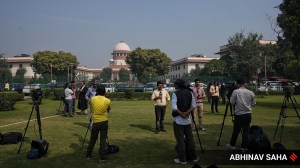- India
- International
Andhra Pradesh moves to scrap Vidhan Parishad — why some states have Legislative Council
Opposition to the idea of Legislative Councils is centered on three broad arguments. One, they can be used to park leaders who have not been able to win an election. Two, they can be used to delay progressive legislation. Three, they would strain state finances.
 After the Cabinet meeting, the Assembly will meet later today to introduce a resolution to abolish the Legislative Council.
After the Cabinet meeting, the Assembly will meet later today to introduce a resolution to abolish the Legislative Council.
On Monday (January 27) morning, the Andhra Pradesh Cabinet decided to abolish the state’s Legislative Council. The Council had last week referred the contentious capital decentralisation Bill to a Select Committee for review. The Telugu Desam Party (TDP), which is in majority in the Council, had blocked the Bill from passing.
After the Cabinet meeting, the Assembly will meet later today to introduce a resolution to abolish the Legislative Council.
After passing the resolution, the government will send it to the Governor for his approval and then send it to Parliament for ratification.
Explained: What is Legislative Council?
India has a bicameral system i.e., two Houses of Parliament.
At the state level, the equivalent of the Lok Sabha is the Vidhan Sabha or Legislative Assembly; that of the Rajya Sabha is the Vidhan Parishad or Legislative Council.

The second House of the legislature is considered important for two reasons: one, to act as a check on hasty actions by the popularly elected House and, two, to ensure that individuals who might not be cut out for the rough-and-tumble of direct elections too are able to contribute to the legislative process.
The Councils are less powerful than the Rajya Sabha, however. Unlike, the Rajya Sabha, which has substantial powers to shape non-financial legislation, Legislative Councils lack a constitutional mandate to do so; Assemblies can override suggestions/amendments made to a legislation by the Council.
Also, unlike Rajya Sabha MPs, Members of the Legislative Council (MLCs) cannot vote in elections for the President and Vice President. The Vice President is the Rajya Sabha Chairperson; an MLC is the Council Chairperson.
Explained | Three capitals for Andhra Pradesh — its logic and the questions it raises
How are Council’s members elected?
Although its membership may vary in each state, the Legislative Council must not have more than a third of the total membership of the Assembly of that state, and in no case fewer than 40 members.
About 1/3rd of members are elected by members of the Assembly (MLAs), another 1/3rd by electorates consisting of members of municipalities, district boards and other local authorities in the state, 1/12th by an electorate consisting of teachers, and 1/12th by registered graduates.
The remaining members are nominated by the Governor from among those who have distinguished themselves in literature, science, art, the cooperative movement, and social service.
The Legislative Councils are permanent Houses, and like Rajya Sabha, one-third of their members retire every two years.
What is the argument against having Legislative Councils?
Opposition to the idea of Legislative Councils is centered on three broad arguments. One, they can be used to park leaders who have not been able to win an election. Two, they can be used to delay progressive legislation. Three, they would strain state finances.
Which states have Legislative Councils?
Apart from Andhra Pradesh (58 members), five other states have Legislative Councils: Bihar (58), Karnataka (75), Maharashtra (78), Telangana (40), Uttar Pradesh (100).
Jammu and Kashmir too had a Council, until the state was bifurcated into the Union Territories of J&K and Ladakh.
Tamil Nadu’s then DMK government had passed a law to set up a Council but the subsequent AIADMK government withdrew it after coming to power in 2010.
Andhra Pradesh’s Legislative Council, set up in 1958, was abolished in 1985, then reconstituted in 2007. The Odisha Assembly has also passed a resolution for a Legislative Council.
Proposals to create Councils in Rajasthan and Assam are pending in the Rajya Sabha.
The parliamentary committee that examined the Rajasthan Bill advocated for the evolution of a national policy for creation/abolition of Legislative Councils. It said, “…the status of Second Chamber cannot be of temporary in nature depending on the mood of the Government of the day nor can be abolished once created, only at the whims and fancy of a newly elected Government in the State.”
Don’t miss from Explained: Importance of the 75th anniversary of the liberation of Auschwitz
More Explained
EXPRESS OPINION
Apr 26: Latest News
- 01
- 02
- 03
- 04
- 05










































